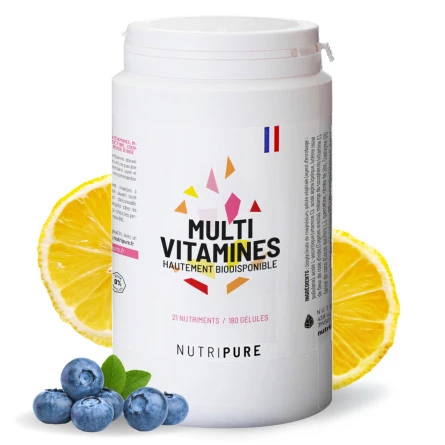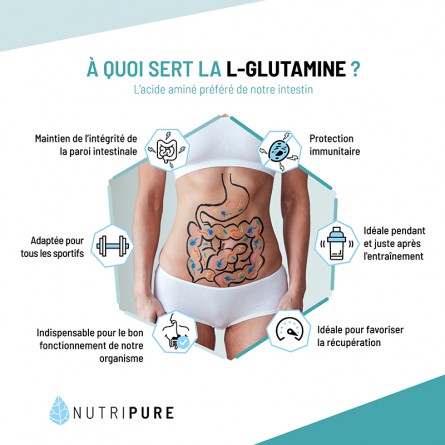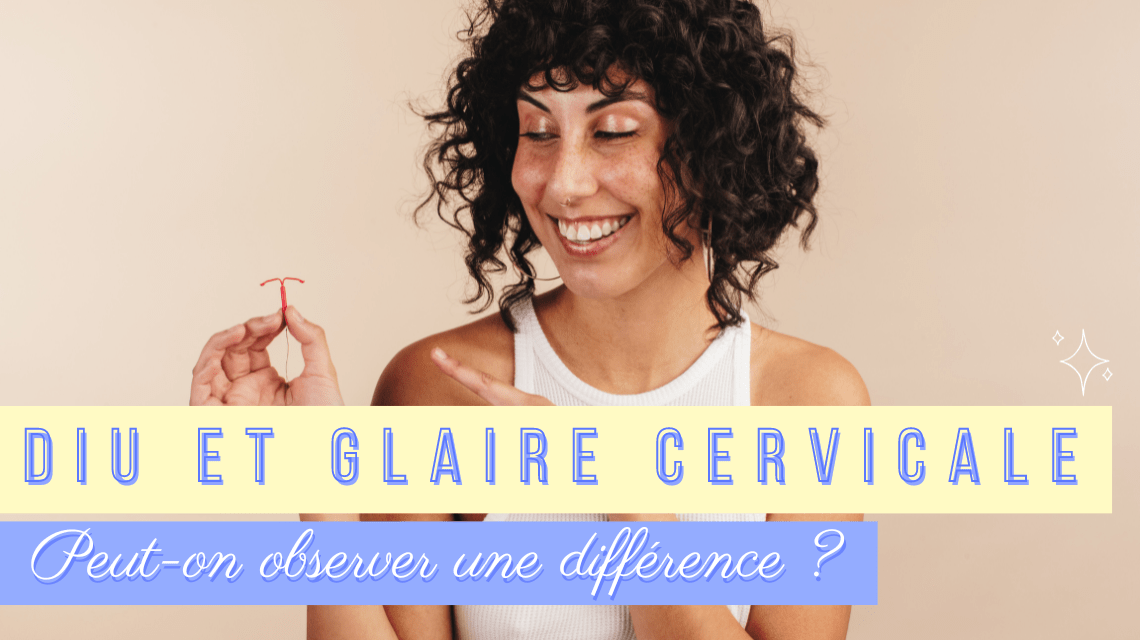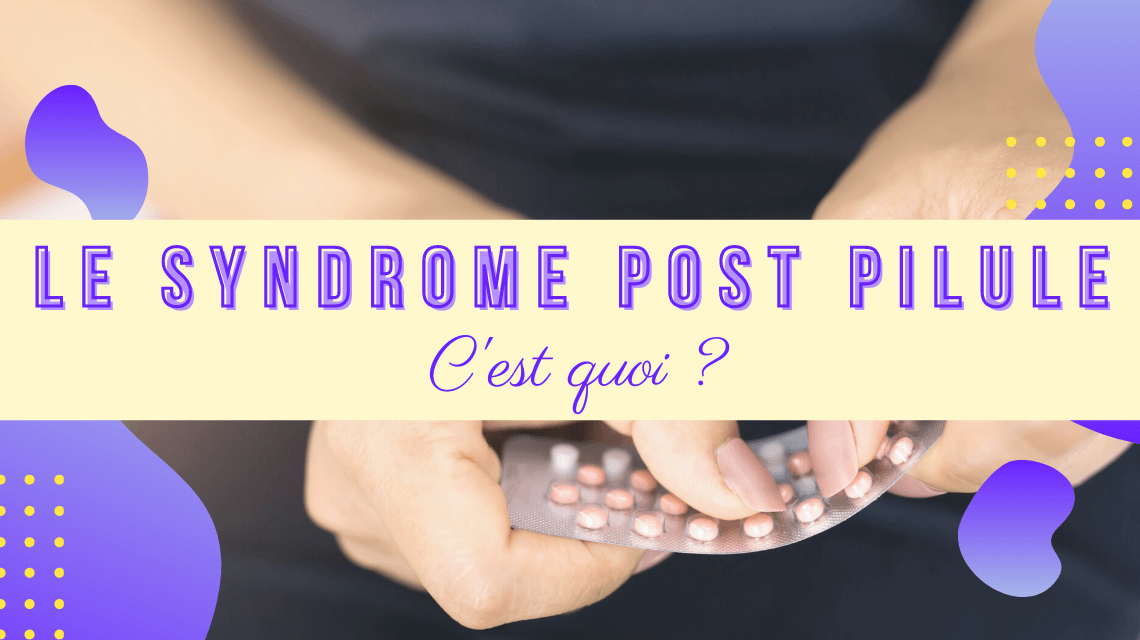Discontinuing the pill leads to hormonal changes. It may take some time for the natural cycle to return. Doing everything you can to support and accompany your body through the post-pill transition then becomes essential! In this article, we'll take a look at a number of tips to help you restore your hormonal balance. With one objective: say goodbye to stopping the pill and hormonal imbalance, and welcome the return of a healthier menstrual cycle with complete peace of mind!
How do I rebalance my hormones after stopping the pill?
Stopping taking the pill requires a lot of resources from your body and hormonal system. To help it, it will need all the necessary nutrients that may have been depleted by taking the pill: zinc, magnesium, selenium, B12. Make sure you eat enough, and increase your protein intake in your meals. Next, it's important to take care of your digestive health. Glutamine is a dietary supplement that can help your intestines.
What are the symptoms after stopping the pill?
This hormonal imbalance after stopping the pill causes different symptoms in every woman. These post-pill symptoms, or rebound effect, can occur :
- Delayed cycle or absence of periods for several weeks
- More painful and/or heavy periods
- Tension or tenderness in the breasts
- Mood swings and irritability
- Return of PMS, premenstrual syndrome
- Acne on the face and/or back
- Libido making a comeback
- Greasier hair
- Weight loss
When do the hormones in the pill disappear?
As soon as you stop taking the pill, the synthetic hormones will diminish. After a few weeks, your natural cycle will resume. There may be a few bumps in the road, but the symptoms experienced several years after stopping the pill are linked to a deeper hormonal imbalance.
Add fat to your daily diet
A quick recap of the importance of lipids in our bodies:
- They form the structure of our cell membranes (that's enough to sum up their importance :));
- They play a major role in the transport of certain proteins and hormones in the blood;
- They serve as cab vehicles for fat-soluble vitamins (A, D, K, E), which are soluble in the presence of fats;
- They are involved in theproduction of some of our essential hormones, including certain sex hormones!
Steroid hormones (including estrogen) are made from cholesterol! And yes, cholesterol is not a dirty word. On the contrary, it's essential to our bodies and to the production of sex hormones.
Cholesterol itself is derived from the synthesis of certain fatty acids. It's therefore essential to provide it on a daily basis to nourish the hormone production chain!
We often hear about good fats and bad fats, but the reality is not far off, albeit a little more nuanced.
Those that we limit and those that we consume with reason:
Above all, we're going to limit the trans fats and hydrogenated fats found mainly in industrial and processed products! (ready-made meals, fast food, cookies, pastries, industrial cakes...). That's nothing new - we're already well aware of it!
Then there are saturated fatty acids (long described as bad fats because they are thought to be responsible for various pathologies - cardiovascular disease, bad cholesterol -). Today, we are more aware of their essential benefits for the body!
These are the fatty acids found, for example, in meats and cold meats, in dark chocolate, in coconut oil... Not all are equivalent, and some may be preferable.
For example, lauric acid, which is found in large quantities in coconuts and therefore in coconut oil, has antiviral, antibacterial and immune-boosting properties. Coconut oil is also a very interesting oil to use in cooking and baking. Because it can withstand high temperatures. In addition, for people with sensitive livers, this oil is very interesting. It is rapidly assimilated by the body and does not need to be synthesized by bile or enzymes. It does not overtax the liver!
★ Those that can be integrated :
Then comes the all-important part in terms of fatty acids, the omega-3 fatty acids ! They are essential to our organism from various points of view (hormonal system, nervous system, immune system...). Our diet contains very little of it. They are truly essential for the hormonal sphere. They are precursors of some of our chemical messengers responsible for pain management, notably through their anti-inflammatory action.
Where to find these sources of fatty acids?
- They can be found in vegetable sources, which provide a source of ALA (alpha-linolenic acid) : oilseeds (chia seeds, cashew nuts, etc.), walnut oil, hemp oil, linseed oil, camelina oil, certain seaweeds and micro-algae from seawater which provide DHA (schizochytrium; Crypthecodinium cohnii)...
- Also in animal sources, they provide a source of EPA and DHA: in egg yolks (Bleu-Blanc-Cœur organic label), in fatty fish (salmon, tuna, herring, sardines, mackerel).
What about vegetable sources of Omega 3?
Plant sources (with the exception of seawater algae and micro-algae) are less well assimilated by the body than animal sources. In fact, they provide the basis for the fatty acid AHA, which must be converted into EPA and DHA in order to be "used" by the body. Their conversion rate to EPA and DHA is very low, which means that omega-3 levels provided by plant sources alone are not sufficient to meet the body's needs. This is something to consider for those following a vegetarian*based diet. You'll need to supplement your diet with seaweed and micro-algae (schizochytrium, Crypthecodinium cohnii) to ensure a sufficient supply of fatty acids that can be directly assimilated by the body.
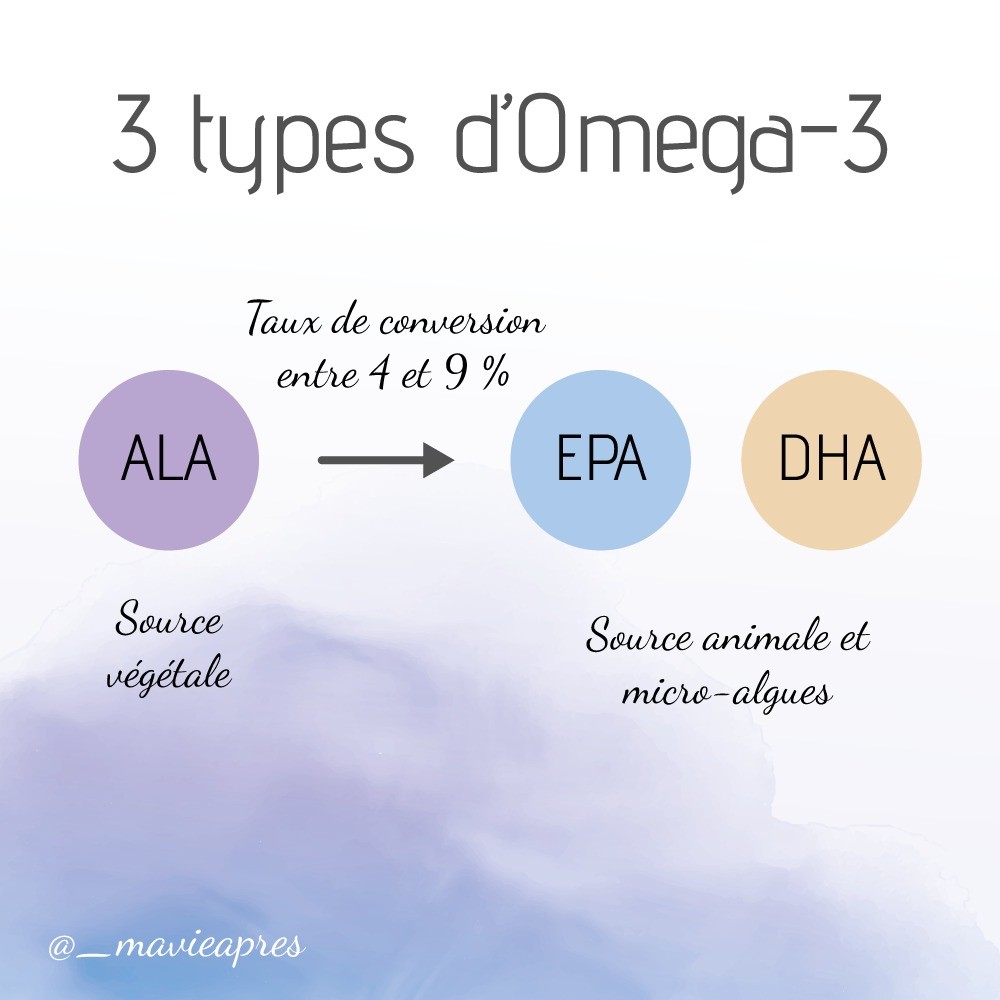
Conclusions on the different sources of Omega 3
Things to remember : we can already provide a daily source of omega-3 fatty acids with vegetable oils containing them (hemp, flax, walnut, camelina...) for good reason 1 to 2 tablespoons per day ! Note that essential fatty acids are better assimilated from the oils mentioned above than from seeds and oilseeds, which require an additional process upstream, namely digestion, in order to extract the nutrients. So it's more direct with oils.
Oils rich in omega 3 are very fragile and their quality is also very important:
- We choose organic
- From first cold pressing
- Store in a dark place in the fridge.
- They are consumed quickly after opening (3 to 4 weeks).
- They should never be cooked or heated (otherwise all their precious nutrients will be destroyed).
- They can be added as a topping at the end of cooking, even on a hot dish.
As far as animal sources are concerned, you can also eat 2 to 3 portions of small oily fish per week, if you eat them at all. Moreover, to benefit from the nutrients present in egg yolks, they should be eaten runny, not cooked.
Improve digestion
Emunctories are organs that act as outlets for waste and toxins outside the body. The 2 main organs to which we call your attention are the liver and intestines. To learn more about this topic when stopping the pill, we encourage you to read this article → (5 key steps to take when stopping the pill) . But it's not just when you stop taking the pill that it's important to take good care of them. After all, they play a vital role in the body's day-to-day functions.
In particular, they play an indirect role in the production of sex hormones, since cholesterol is synthesized in these major organs! You understand a little the virtuous circle of all this little world... 🙂
What's more, their elimination function both neutralizes and evacuates synthetic hormone residues when the pill is stopped. But it also neutralizes and evacuates any excess hormones produced during the menstrual cycle. They therefore play a direct part in balancing the hormonal balance, constantly ensuring that the levels circulating in the blood are adapted to the body's needs.
Thanks to our diet and simple daily actions, it's easy to take care of them and make sure they're always in tip-top shape!
Regular physical activity
Physical activity is at the heart of a number of processes that are fundamental to the body's equilibrium! It goes without saying that this is also the case for the proper balance of our hormones, particularly our sex hormones!
Physical activity has a strong impact on the nervous system. And the nervous system is obviously linked to the endocrine system (hormonal system). Why?
Sport encourages the production of hormones such as dopamine!
What's its link with the menstrual cycle? Dopamine is the main inhibitor of prolactin (yet another hormone...). Prolactin is the lactation hormone. It is therefore produced in large quantities during pregnancy and breastfeeding, BUT some women may have higher levels when not pregnant or breastfeeding. The result? This hormone blocks ovulation . This is normal in the case of a breast-feeding woman, but becomes annoying when the need arises. ! So dopamine production is important to regulate prolactin levels and thus promote harmony in the production of the main sex hormones (progesterone, estrogen).
Physical activity also has an impact on the body's capacity for elimination. It stimulates blood and lymph circulation, which amplifies the elimination process.
Taming stress management
We're not saying anything new when we tell you that stress has a significant impact on your body. It's one of the most troublesome factors in today's society.
What's the link between stress and the hormones in your cycle?
Any particular connection with your menstrual cycle? Yes. One of the stress hormones is produced in the same place as 2 of your sex hormones... LH and FSH. They're the great messengers responsible for stimulating the ovaries to produce estrogen and progesterone (the interior architects of your uterus).
What are the hormones of the menstrual cycle?
What you need to understand, then, is that when your pituitary is busy producing stress hormones, it "leaves aside" the more secondary production of other hormones such as LH and FSH. Why? Stress hormone production is bound to overtake everything else. And for good reason: stress is basically a natural defense reaction of the body. It puts all our senses on alert to face danger, so it's a first-rate action.
So it's an extremely important natural body reaction. The problem is that we are in a situation where we are often constantly exposed to stress factors (work, private events, processed food, poor sleep...). And the whole point of the body's primary defense system generated by stress loses coherence once it becomes chronic.
Things to remember
Being too often exposed to stress factors and/or being highly sensitive to the effects of stress completely interferes with the "normal" ballet of hormones involved in the smooth running of the menstrual cycle.
How do you manage stress?
How do you go about it? We're not going to give you the most boatload of advice, which is to reduce your stress or try to "stress less". It's certainly coherent, but it's easier said than done.

Identifying stress factors
In concrete terms, the first step would be to identify the stress factors in your daily life. Becoming aware of them and isolating them is a huge step forward! Because very often, we consider as "normal" situations or habits that are in fact factors that little by little tend to unbalance us and push our organism to the limit, with our own consent!
Isolating these stressors
Identifying and isolating them is the first big step towards feeling better! Then it's up to you to find out how you can adapt, limit or even eliminate your exposure to these stress factors. It's not about changing your daily routine overnight! It may scare you, and it may not be a lasting decision. It's best to take small steps, concentrating on one day at a time.
In search of solutions to eliminate stress
You've isolated the main stressors in your daily life. So ask yourself this question: "Today, how can I adapt, limit or even eliminate my exposure to this or that stress factor?". You can do this exercise over several days. You'll see that as you go along, you'll have come to grips with the main situations and stressors in your daily life. You'll know better how to deal with them, and some will even have disappeared! So it's not an infallible technique, but it's already a very good exercise. So it's up to you 🙂
Don't miss out on a good night's sleep
Our days and our daily actions are governed by our internal clock. There's a time for everything, and above all there's a time for sleep and a time for everything else.
And quality sleep is quite simply a real engine for our organism. It's essential for many vital functions, from cell regeneration to... hormonal balance, of course.
So if a hormonal imbalance can cause certain sleep disorders, the reverse is also true. Too little restorative sleep or an excessively hectic lifestyle can alter our hormonal balance!
In particular, there is a link between estrogen levels and serotonin levels. Serotonin is a major neurotransmitter in our body.
Things to remember: a fast-changing lifestyle (staggered working hours, jet lag...) or insufficiently restorative sleep have an impact on our hormonal balance.

Our body likes regular things it can rely on: Regular bedtimes, regular wake-up times, regular mealtimes... It's not always easy in our day-to-day lives... But the important thing is to be able to stretch them as far as possible, to give them time to settle in and rest.
Once again, it's a question of balance. So if sometimes our rhythm of life tends to be a little more irregular for various reasons, we try to give ourselves the means to restore the balance little by little afterwards.
Now you have all the information you need to take care of yourself and your hormones when you stop taking the pill! Don't hesitate to contact us in private messages on Instagram or in comments under this article for any questions related to the menstrual cycle, we're always happy to chat with you :)!


